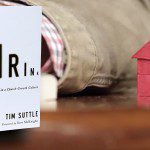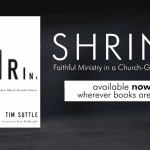 At my church we’re doing a series on four great saints of the church. They don’t have to be actual canonized saints, just someone whose life can teach us something important. Week one was the life of Corrie ten Boom. Her memoir The Hiding Place, and the movie based upon it, have been around for decades and are still being read and watched.
At my church we’re doing a series on four great saints of the church. They don’t have to be actual canonized saints, just someone whose life can teach us something important. Week one was the life of Corrie ten Boom. Her memoir The Hiding Place, and the movie based upon it, have been around for decades and are still being read and watched.
Most of us understand the atrocities of a Nazi concentration camp. We know what happened there and can conjure up the images in our imagination – cattle cars packed with people travelling for days with nothing but a bucket in which to relieve themselves, forced labor, starvation, torture, disease, gas chambers, and crematoriums. It was hell on earth.
When Corrie and Betsie ten Boom arrived at Ravensbruck – a notorious Nazi death camp that killed nearly 100,000 women – they spent their first night in an open field hiding from the drizzle under a thin blanket. After three days sleeping out in the open they were taken to an intake barracks – a building designed for 400 women that then held 1400. After a month there, they were taken to barracks 28, which would be their last stop. The first night in barracks 28 they listened to the sound of fighting as it erupted throughout the room. A burst of shouting, the sound of slaps and punches, sobbing, and then the quiet, mournful tears to which they all fell asleep. Betsie remarked that there had been too little praying in that place, and the two sisters set about to change that reality.
They began to lean into a verse from 1 Thessalonians: “Rejoice always, pray without ceasing, give thanks in all circumstances.” This verse began to guide their approach to their own captivity and torture. In their barracks at night, they would huddle around the scriptures. Betsie would read a passage, and the women closest would translate the Dutch text into German, Russian, Polish, and back into Dutch. Then the words would be whispered along like a game of telephone until they had reached all who wanted to listen, all who were huddled around the two sisters. Then Corrie would preach. She would tell them the Nazi narrative was false, that human beings had dignity, that life was precious, and that this incredible evil was not stronger than the love of God, so it would be defeated one day. Corrie’s words would be translated and passed around the room as well.
Over time something strange began to happen. The women started to believe it was true. Barracks 28 became an oasis of peace in the midst of a storm of hellish violence and torture. Every night the women could look forward to at least a few minutes – sometimes an hour or more – in which to gather with other women to read the scriptures and pray. It became for them a source of strength. They were a little colony of heaven in a culture of hell.
This is one of the best metaphors of the church I’ve ever read. The church in our culture should gather in the same way, and largely for the same reasons.
It is said that when we are faced with the insidious face of evil, when we lock horns with the problem of suffering we nearly always ask the same question: If God is good and all-powerful, then why is this terrible thing happening? It is, after all, an impossible question. There are many great answers (I highly recommend N.T. Wright’s book Evil and the Justice of God), but none of them settle the matter. The reason you know the matter isn’t settled is that the question lingers, and will always linger. You cannot make sense of suffering. You cannot reason with it, or make sense of it. The question never goes away because the answer lies in learning to transcend the question.
In that Nazi death camp, Corrie and Betsie ten Boom were able to stop asking the question of suffering – is God good and all-powerful? – and start asking the more essential question: how can I serve God’s kingdom here and now? The movement from that first question to the second question is the movement all of us must learn how to make. The movement away from endless questions about God’s power and goodness, and toward the missional question (What is God doing in this place, and how can I join with that mission?), is the difference between despair and hope, the dehumanizing power of suffering, and the indefatigable beauty of peace.
[A quick aside: The first question is a question of sovereignty – is God in control and does God have the faculties to deal with a horrible evil. The second question is a question of incarnation – how does God incarnate in a particular situation. The missional movement refuses to get stuck in the question of sovereignty. This is one of the major points of friction between the missional and neo-Reformed/puritan camp. The movement toward Christian maturity is always toward incarnation.]
Corrie and Betsie ten Boom didn’t believe God “put them” in the concentration camp. They understood completely that it was the Nazi’s who put them in that hellish place. But as long as they were there, they asked the missional question, and got to work praying, bringing hope and peace to the place you would least expect it.
The reason I think the Christian story helps us make sense of evil and the problem of suffering, over and against all other attempts to do so, is that only our story has a God who suffers. As Jim Belcher has said, “The sovereign God is the suffering Jesus.” The power of God over evil subsists not in God’s sovereignty alone, but in God’s sovereignty-incarnate.
When we suffer, God suffers with us.
Only this reality offers the possibility of peace in the face of unspeakable evil. This reality is the hope of the world. That the sovereign God is the suffering Jesus means that suffering actually has the power to nurture faith. Wherever that happens, God explodes evil from the inside out. That’s exactly what happened in barracks 28 of Ravensbruck Concentration Camp. That’s what needs to happen in all of our churches, in all of our towns and cities, and in our own lives.












